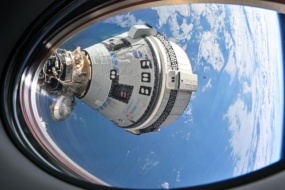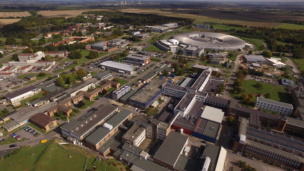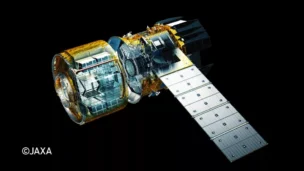The International Space Station has served as a beacon of international diplomacy, ground-breaking R&D, and scientific discovery for nearly 30 years. Its commercial follow-on could serve as a movie set, thanks to Axiom and its entertainment partner.
The policy and regulatory challenges facing commercial space station developers were front and center at Thursday’s Beyond Earth Symposium in DC. Officials also discussed the sustainability of the Artemis program, base-building on the Moon, and cooperation with China (or lack thereof).
Kathy Lueders, the head of NASA’s human spaceflight program, emphasized that companies shouldn’t be working on an ISS 2.0 with the government as the primary intended customer. “I don’t want you building a platform for me,” she said. “If you’re doing that, you’re not thinking big enough.”
Opening space to the masses
Because the next generation of space stations won’t primarily be government-run research labs (Tiangong notwithstanding), companies say they need to think differently about how to serve consumers, movie crews, and artists. Instead of the austere, cramped living conditions on the ISS, visitors to Voyager’s Starlab will stay in accommodations designed by Hilton. No word on whether they’ll earn points, though.
“This isn’t a NASA space station,” Eric Stallmer, Voyager’s DC lead, said Thursday. “What’s going to drive investment? Because NASA isn’t going to be paying the full bill for this.”
Tech isn’t the biggest hurdle
The ISS proved that humanity can continuously live in LEO. But widening the aperture on who can access space raises lots of questions about safety, international cooperation, and the regulatory regime that should govern commercial fliers.
“The kinds of things that we wanted to do for an entire generation of spaceflight are now coming to a finer point, where we are resting on the challenges of policy…[and] economics in order to enable us to go and do all the good technical work we know is possible,” said Erika Wagner, Blue Origin’s senior director of emerging space markets.
One potential question Wagner raised is who will oversee science in orbit on commercial platforms. “If I want to do biotech work in LEO, how do I do that?” she asked. “The ISS has done it under the supervision of NASA. We are now under the supervision of the FDA.”
Earthly challenges
The pandemic also set back private space station developers. Axiom, the orbital outpost front-runner, won a NASA contract in February 2020 to build on to the ISS. As a consequence of Covid-related labor shortages, the company, which has the rights to the only commercial segment slot of the ISS, has pushed the launch of its first module back to late 2025.
Mary Lynne Dittmar, Axiom’s chief government and external relations officer, said yesterday that the company is on track to launch a second module six to eight months later, followed by a refurbished cargo module and a service module. “After that one is finally launched and integrated, then shortly after that, we’ll depart the station and become a free-flier,” she said.
+ Further reading: The Beyond Earth Institute released four policy papers in conjunction with the event, covering commercial space stations, a cislunar ecosystem, financing for infrastructure in space, and spaceflight safety.




